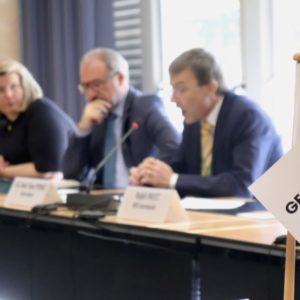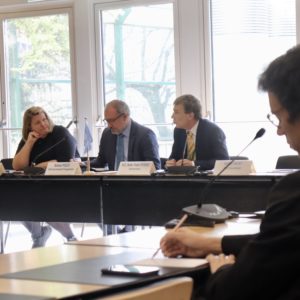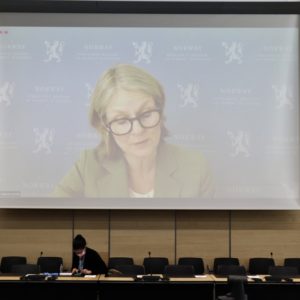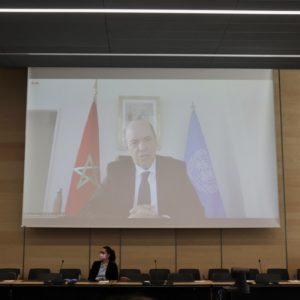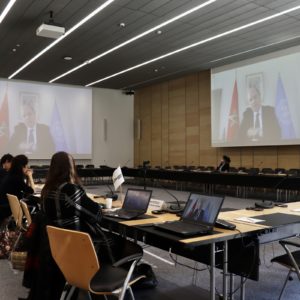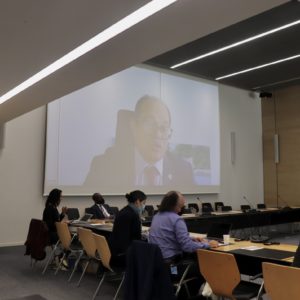Événement Conférence
High-Level Debriefing on the 5th Session of the United Nations Environment Assembly

This event provided an update on the outcomes of the resumed fifth session of the UN Environment Assembly, which took place in Nairobi and online, from 28 February to 2 March 2022.
About this Session
The resumed fifth session of the UN Environment Assembly (UNEA-5), the world’s highest-level decision-making body on the environment, took place in Nairobi and online, from 28 February to 2 March 2022, and was followed by a special session, to commemorate the 50th anniversary of the establishment of the United Nations Environment Programme (UNEP@50).
The assembly concluded with two declarations, 14 resolutions and one decision on a number of critical issues to curb pollution and to protect and restore nature worldwide. In a historic resolution, delegates agreed to establish an Intergovernmental Negotiating Committee with the mandate to forge an international legally binding agreement to end plastic pollution by the end of 2024.
This debriefing provided an update on the outcomes of UNEA-5, reflected on the priorities for the next session, to take place in 2024, as well as the processes in Geneva that can contribute to UNEA-6.
Speakers

H.E. Amb. Tine MØRCH SMITH
Permanent Representative of Norway to the UN and other International Organizations in Geneva (UNEA-5 Presidency)
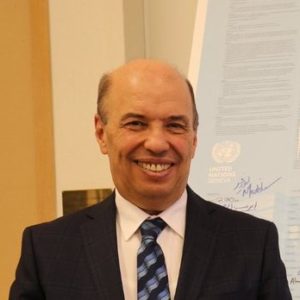
H.E. Amb. Omar ZNIBER
Permanent Representative of Morocco to the United Nations Office at Geneva and other International Organizations in Switzerland (UNEA-6 Presidency)
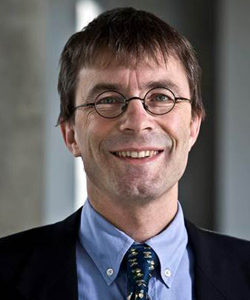
H.E. Amb. Franz PERREZ
Ambassador for the Environment, Switzerland

Rolph PAYET
Executive Secretary, Basel, Rotterdam and Stockholm Conventions

Patrizia HEIDEGGER
Director Global Policies and Sustainability, European Environmental Bureau

Ingrid ROSTAD
Advisor Norwegian Forum for Development and Environment (ForUM)
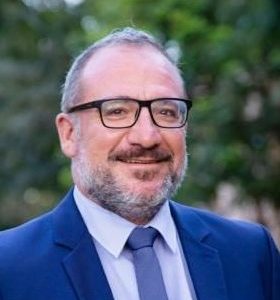
Bruno POZZI
Director, Europe Office, UN Environment Programme
Summary
Welcome & Introduction – UNEA Delivering | Bruno POZZI
UNEA-5.2 was an intensive meeting preceded by a week of intense negotiations in the OECPR. There were more than 3000 participants, 500 of which attended online. 175 Member States participated, probably the highest participation rate in a UN Environment Assembly. 79 ministers and 17 high level officials participated in the negotiations. UNEA-5.2 marked an incredible moment because for two years we had not seen each other: it was an opportunity to be the voice of the environment and to negotiate resolutions.
These negotiations were very successful as 14 resolutions were adopted, as well as important decisions and a strong Ministerial Declaration. There initially were more resolutions, but some were merged in the process. The resolutions are the result of the world coming together to negotiate and change the way we address the environment globally. These 14 resolutions were clustered in five different pillar, representing all the priorities of the triple planetary crisis.
Plastic pollution
The adoption of a groundbreaking resolution started a process to set up an internationally legally binding instrument (LBI) to end plastic pollution (UNEP/EA5/L23/REV.1). Tackling plastic pollution is complex and requires a holistic approach, looking at the whole life cycle of plastic from production to the end of life of the product. This resolution was adopted unanimously after very long hours of negotiations and very strong engagement by all Member States and stakeholders. They strived to give UNEP a strong mandate to lead this work, asking the Executive Director to convene an International Negotiating Committee (INC) starting its work in the second half of 2022 with the ambition of completing it by the end of 2024. If the INC achieves a solution, we will have an international LBI to tackle plastic pollution, including in the marine environment, including both binding and voluntary approaches. This instrument will have a comprehensive approach on the full life cycle of plastic. This historic moment was celebrated in Nairobi with cheers and clapping unprecedented in a UN meeting.
Nature and biodiversity
Four resolutions were adopted unanimously. These regarded, 1) Sustainable Lake Management (UNEP/EA5/L8/REV.1); 2) Nature-based Solutions for supporting sustainable development (UNEP/EA5/L9/REV.1) – marking for the first time a unanimously understood and accepted definition of NbS in the UN; 3) Animal Welfare – Environment – Sustainable Development nexus (UNEP/EA5/L10/REV.1); 4) Biodiversity and Health (UNEP/EA5/L11/REV.1).
Chemicals, Waste and Pollution
Another groundbreaking moment was achieved with the adoption of a resolution that sets in motion a Science Policy Panel to contribute to the sound management of chemicals and waste and to prevent pollution (UNEP/EA5/L14/REV.1). Considering that the other two planetary crises already have a designated panel (IPCC for climate change and IPBES for biodiversity), this new SPP is an important step to address the third planetary crisis backed up by a very strong mandate to UNEP. Work is starting, the team is being put in place and the ambition is really high. The resolution on the sound management of chemicals and waste (UNEP/EA5/L13/REV.1) is also extremely important and represents a victory of multilateralism.
Green Recovery and Circular Economy
This cluster discussed how to promote circular economy for this post-pandemic period. One of the resolutions concerns sustainable and resilient infrastructure (UNEP/EA5/L15/REV.1). Considering that infrastructure will triple in the next 50 years, if these are not built sustainably, it will impair the achievement of all targets. The other resolutions on the post COVID-19 recovery (UNEP/EA5/L16/REV.1), on the promotion of circularity to achieve sustainable consumption and production (UNEP/EA5/L17/REV.1), and on the governance of minerals and metals management (UNEP/EA5/L18/REV.1) are all linked and demonstrating that without sustainable infrastructure, without sustainable use of minerals and natural resources and without circularity, targets will not be achieved.
Organizational and Administrative Matters
UNEA adopted a resolution on geographical distribution of staff in UNEP (UNEP/EA5/L19/REV.1) to better reflect the diversity of our membership. A resolution on the future of the Global Environment Outlook (UNEP/EA5/L20/REV.1) was passed as Members Stated agreed to continue this work, guided by science and with the analysis that UNEP is uniquely placed in the UN system to bring forward environmental issues. The Global Environment Outlook includes everything you need to know about the state of the environment and where we are going. Lastly, the resolution on UNEA-6 was adopted (UNEP/EA5/L21/REV.1). It will take place from 26 February to 1 March 2024 in Nairobi with Morocco as Presidency.
UNEA also adopted a Ministerial Declaration, which puts forward the need to strengthen the action for nature to achieve the SDGs, and the need for transformative and systemic change. UNEA was followed by the celebration of UNEP@50. Member States came together to look back at the achievements over the past 50 years and forward to what we still need to do to tackle the triple planetary crisis. What UNEP does, does not happen in an environmental vacuum. It is done for the people who are on our beautiful blue planet. The event also saw the launch of “The UNEP We Want”, an ambitious report on what UNEP as leader in the environment has to do and deliver in the next 50 years. A Political Declaration was adopted, commemorating the 50th anniversary of UNEP’s establishment and looking forward at what we need to adopt in the future.
Perspectives from UNEA-5 Presidency| H.E. Amb. Tine MØRCH SMITH
UNEA.5-2 was indeed a historic moment. In Nairobi, the global community came together to act on 14 Resolutions and two Ministerial Declarations. It was agreed to start negotiations of an international legally binding instrument to end plastic pollution and to complete these by the end of 2024. The UN Secretary General stated that this is an historic decision and the most significant for the global environment since the Paris Agreement in 2015. This shows that UNEA can indeed act on the most pressing environmental issues of our time – even in times of geopolitical turmoil and conflict.
Delegates have agreed to work towards a science-policy panel on chemicals, waste and pollution following the models of the IPCC and the IPBES. This will be a big step to address the third planetary crisis of pollution and ensure evidence-based policy making. We have also agreed to a global definition of nature-based solutions for the first time in the UN: nature can provide the solutions we need to solve environmental challenges. We must work with nature. At UNEA, we saw a dynamic where good results in some areas inspired better results in others. But we would not have succeeded without the dedication and hard work in preparing the Assembly that has taken place over the past three years, by both civil society and state actors.
Despite the COVID-19 pandemic, we have continued to keep up the pace to address the environmental challenges the world is facing and to use the multilateral system. We were glad to agree a Ministerial Declaration that brings together ambitions in a holistic way. Now the challenge is making sure it is followed up, contributing to fulfilling the environmental dimension of sustainable development. The UNEA5 declaration supports a broader understanding of the value of tackling the triple environmental crisis. It is also the road to delivering on the socio-economic dimensions of the SDGs. Nature-based solutions will provide part of the solution to all three crises. The green industries we need for de-carbonisation, circularity, clean energy and resource efficiency, can simultaneously deliver on jobs and economic development. The best strategies will differ with region and country, while the sharing of best practises and tangible solutions must be wide and inclusive. It is also important to highlight all the work needed to achieve the political declaration from the special session UNEP@50. The process was very difficult, but it has provided a valuable opportunity to scrutinize and improve the terms of implementation of environmental commitments, across all regions, and also for strengthening UNEP.
The Geneva Environment Network has played a key role in the of these events preparations, facilitating dialogue, information sharing and building knowledge on many key issues. Informal and issue-based discussions like the Geneva Beat Plastic Pollution Dialogues are important for increasing our knowledge and ripen our understanding of the issues at hand.
This is also the moment to congratulate Morocco on their UNEA6 Presidency. Many important processes will have to advance, and some also to reach conclusion under your watch as UNEA President. Norway stands ready to continue its active engagement in these processes in the years to come, continuing to work closely with partners and build on the strong relationships that were developed during this process. Together with Rwanda, Norway has launched a High-Ambition Coalition to ensure we keep up the ambitions for the new instrument on plastic pollution. This initiative seeks to build a broad-based coalition, with members from all regions of the world. The focus will be to deliver key messages before the INC meetings to drive ambition in the process, as well as work inter-sessionally at the technical level to develop knowledge products and facilitate discussions in key areas to inform decision-making.
In conclusion, we can repeat the theme for UNEA5.2 and confidently say that we did “Act for Nature”. But as we all know, the work is far from over. Norway looks forward to its continuation.
Perspectives from Switzerland | H.E. Amb. Franz PERREZ
UNEA has a unique role in global environmental governance. It has the triple function of providing scientific information necessary for policy-making; providing policy guidance necessary to protect the environment; and catalyzing action. During the last UNEA session, the international community was able to agree on collective actions on a number of substantial issues – demonstrating the relevance of this unique forum. As UNEA only meets biannually, it must take ambitious steps forward. Despite pressure prior the meeting due to the number of resolutions, UNEP organized UNEA instrumentally to deliver on a broad agenda, succeeding also in an unprecedented hybrid format.
For Switzerland, it is key to make the best use of UNEA and to ensure it can really provide the strategic direction for global environmental action. It is important to present more traditional resolutions like the one on chemical and waste to continue to strengthen our action but also to come up with innovative and ambitious proposals like the one on the Science-Policy Panel. Switzerland also values bringing to the attention of the international community topics that would otherwise not be on the agenda, such as mineral resource governance. We also always try to have an eye on emerging issues, for example on climate-altering technologies and measures (CATM), to try to be one step ahead and not behind. Switzerland actively supported four successful resolutions.
On Plastic Pollution
Switzerland has been engaged throughout the preparations, and is celebrating the historic decision to address plastic pollution through an international LBI. The most important elements of this resolution are the establishment of INC inclusive of marine pollution and the whole lifecycle of plastics. Specific measures to support sustainable product consumption, design and waste management, resource efficiency, circular economy and more were adopted. As some things cannot be achieved through voluntary measures, the LBI will rely on both binding and voluntary actions. The schedule adopted is a rather fast one, as it aims to conclude negotiations by 2024. However, rapidity should not come at the cost of ambition. Switzerland believes time is necessary to develop an ambitious instrument and actions. The preparation to such a transformative change needs time, preparation and the inclusion of a broader public, which is not restricted to those who participated in Nairobi. Senegal has offered to host the first meetings of the negotiations and Switzerland is happy to support it financially, hoping this process will achieve positive outcomes.
On the Science-Policy Panel
This resolution establishes a working group (OEWG) to set up a Science-Policy Panel by 2024 to promote sustainable management of chemicals and waste and prevent pollution. The core functions of the SPP will be to undertake horizon scanning to identify issues of relevance to policy makers and propose evidence-based options, conduct assessments of current issues and identify potential evidence-based options, in particular those relevant to developing countries, provide up-to-date and relevant information and identify key gaps in scientific research, and finally facilitate information sharing, in particular with developing countries seeking relevant scientific information
This is really a major development that will fill a gap, as such panels already exist for climate change (IPCC) and biodiversity (IPBES). Now each planetary crisis will have it dedicated scientific body. We strongly believe it will contribute to tackling the pollution crisis and will also be an important resource in the context of the future treaty on plastic pollution. A first meeting of the OEWG will take place in 2022. The idea is to conclude this process after maximum four meetings in 2024, after which UNEP will organize a diplomatic international conference. UNEP will be working closely together with WHO, a highly relevant actor in that area. This process is less over-politicized than the negotiation on plastic pollution, but it will not be a simple one. Still, we hope that it will be a very successful one.
On Chemicals and Waste Management
Switzerland presented the so-called omnibus resolution to strengthen the sound management of chemicals and waste underscores the importance of the post-2020 framework for chemicals and waste and mandates UNEP to continue to support the negotiation process and implement the upcoming decisions. This resolution did not receive as much attention as the previously mentioned ones, but it underscores the need for UNEP to keep working on flagship areas. It also approves the extension of the Special Programme for five years. This program supports Parties in the implementation of the chemicals and waste conventions and SAICM.
Environmental Aspects of Minerals and Metals Management:
This important matter deserves to be more at the forefront. The resolution was initially submitted with a focus on the impact of mineral resources extraction, building on a decision taken at UNEA-4. Minerals are essential to the achievement of the 2030 agenda. Demand for minerals, including sand and gravels, is expected to significantly increase in the coming decades, posing serious supply risks, as well as environmental, economic and social challenges at local, regional and global scales. The resolution calls for the development of proposals to enhance their environmental sustainability along their full lifecycle and encourages Member States and stakeholders to align mining practices and investments with the 2030 Agenda and relevant MEAs. UNEP will convene regional intergovernmental consultations as well as a global intergovernmental meeting. The idea is notably to identify tools, best practices, standards and guidelines, environmentally sustainable technologies, and responsible business practices as well as opportunities to strengthen international cooperation.
All these processes are important for the global environmental agenda. In order to implement successfully the resolutions, we will need the support of all relevant actors. Geneva-based actors and institutions will have a key role to play. The negotiations for an LBI on plastic pollution will require substantive inputs from WTO, WHO, MEAs but also human rights mechanisms. The development of an SPP will also require working with a number of important actors based in Geneva in the areas of global health and pollution. We shall not forget that Geneva s can bring in both expertise and political perspectives of the counties. Through these processes we really hope to create synergies and enhance cooperation – making Geneva the center of gravity to deal with pollution.
The Road to UNEA-6 | H.E. Amb. Omar ZNIBER
Morocco is very pleased with the work done by the delegation of Norway and its achievements at UNEA5. We find ourselves in the aftermath of a successful COP26 in Glasgow, but also after the publication of the last IPCC Report. This represents a strong warning about the deterioration of climate worldwide.
The Moroccan Presidency of UNEA6 both represents the most important global forum for the environment and the African continent. This is important as challenges are the same for all of us, but these are felt more severely in Africa. Morocco has learned this while hosting important global events, such as COP7 and COP22, and regional ones as Technical Coordinator of the Congo Basin Climate Commission, the Initiatives on the Agriculture Adaptation in Africa and the Initiative on Sustainability, Stability and Security in Africa in partnership with Senegal.
On the other hand, Morocco is also an actor here in Geneva and followed closely, in partnership with the delegation of Costa Rica and the other members of the core group, the adoption of a resolution in the Human Rights Council recognizing the Right to a Clean, Healthy and Sustainable Environment (Res. A/HRC/48/L.23 Rev.1). Again, Morocco also collaborates with the WTO on formal dialogues on plastic pollution and environmentally sustainable plastic trade. Therefore, following the achievements on plastics and Nairobi, Morocco has already scheduled actions related to this with the WTO. This is to stress the importance of working closely with all actors in Geneva involved in UNEP’s mandate and who will be engaged for the following two years in the preparations to UNEA6.
Reflections are already developing in Rabat, taking stock of what was achieved in UNEA5. First, is the importance of strengthening the environmental dimension of sustainable development. Making this link will allow generating environmental results for the people. Secondly, the global environmental agenda composed of various Multilateral Environmental Agreements. We must take advantage of the synergetic integration between these agreements and bring it forward. In this regard, Morocco will spare no efforts to work with and support future COP27 and COP28 Presidencies to progress commitments made at COP26, bearing in mind the future COPS will take place in a region that is strongly harmed by climate change and environmental degradation.
It is important to have a holistic focus on questions of waste, chemicals, plastic pollution and their health implications. Morocco intends to act on these latter, considering the unacceptability of the pollution implications for health, particularly for children, reported by WHO.
The Morocco delegation is also aware of the key to success in multilateralism: the development of partnerships. Our presidency will work on the consolidation of existing partnerships, such as the UNEP Science-Policy Platform. It will work for the establishment of new ones regarding emerging environmental challenges, to benefit governments, the private sector and civil society for an innovative solution to accelerate the achievement of its decisions. Multilateral cooperation and international solidarity are essential in the field of environmental protection and sustainable development. The Moroccan Presidency will spare no effort to contribute to revitalizing international cooperation and solidarity, to make these the drivers of the desired change. This intention is evidenced by the personal involvement of His Majestic the King of Morocco, guaranteeing a strong political will in the unfolding of this Presidency. The Moroccan delegation in Geneva wishes to be as active as possible in the future preparations for this event and will try to contribute at its best to common endeavours and goals.
Perspectives from Civil Society | Patrizia HEIDEGGER
The European Environmental Bureau (EBB) together with Women Engage for Common Future facilitated throughout last year a series of international consultations for Major Groups and Stakeholders towards UNEA-5.2 up to the Global Major Groups and Stakeholders Forum just before UNEA.
Outcomes of UNEA in terms of stakeholders engagement.
Major Groups and Stakeholders have been engaging in this process with the mindset that UNEA needs to see significant progress, given that the triple planetary crisis does not leave us much time. We were not fully satisfied with the Ministerial Declaration as it was not particularly strong. We felt it was a shame it did not refer to the Human Right to a Clean, Sustainable, and Healthy Environment, as we were expecting Ministries of Environment to adopt and integrate it. We were also not fully satisfied by the political declaration for UNEP@50, which we expected to be a strong follow-up on resolution 73/333. The Global Major Groups and Stakeholders hoped for a very clear commitment to strengthen international environmental governance in the coming years, absent in the political declaration.
Looking at the successes, UNEA5 did write history in agreeing on launching negotiations for the International Plastic Treaty (UNEP/EA5/L23/REV.1). Civil society and Major Groups and Stakeholders are excited about the opportunity to develop one of the key MEAs of our times since they and the scientific community have played a very decisive role in pushing for that development. When we celebrate this achievement, we must remember that negotiations are only starting, and we hope to see enthusiasm and support to tackle one of the key environmental crises of our times throughout the negotiation process. We need to reduce global plastic production, phase out the most harmful materials, redesign products to avoid plastic waste in the first place. Negotiations will entail a long discussion. We also call on decision-makers to create an enabling environment for Major Groups and Stakeholders in the negotiation process guided by transparency and collaborative spirit.
Civil society and Major Groups and Stakeholders also welcome another resolution on the nexus between animal welfare, the environment and sustainable development (UNEP/EA5/L10/REV.1).
Dedicated action to protect animals and their welfare in the UN policy process has been insufficient to date with devastating consequences for biodiversity, climate, pollution, and global public health. With this resolution, we believe UNEA is providing the much-needed leadership to catalyze governmental action for the environment. In addition, civil society and Major Groups and Stakeholders are content with the three resolutions to address the global crisis on chemical pollution waste (UNEP/EA5/L14/REV.1). The independent Science-Policy Panel on chemical and waste pollution is key to supporting the implementation of the BRS and Minamata Conventions. Another positive factor we welcome is the value given to traditional women’s and indigenous’ knowledge.
We do regret, however, that there has been no coordinated global action taken on hazardous pesticides which poisoning more than 300 million farmers and workers every year. We also welcome the progress on sustainable nitrogen resolution. This was a missed opportunity that the goal to have nitrogen waste globally by 2030 was watered down in the negotiation, marking a small step forward where ambition needs to be raised.
Regarding the resolution on mineral and metal resources (UNEP/EA5/L18/REV.1), it was disappointing that not all Member States fully supported the idea of global mineral resource governance. We believe this is a key area for future action, considering the steep increase in mining activities is creating increasing environmental conflict in all continents and severe environmental and health impact. We do need stricter criteria for no go areas for extractive industries and democratic control and transparency over resource extraction use.
The Major Groups and Stakeholders believe it was a missed opportunity not to set up an intergovernmental working group at this stage but will actively engage in regional consultations on mineral and metal resources.
In conclusion, we do congratulate Member States, UNEP and all participants on the adoption of many groundbreaking resolutions. The work will now begin to implement the resolutions and the Major Groups and Stakeholders can build bridges between words and practice, monitoring action, and for that, we need your continued trust and support.
Regarding stakeholder engagement, we believe that Major Groups’ participation, in general, was very positive at UNEA-5.2, guided by the excellent work of Norway, whose path is already being followed by Morocco. Again, we welcome the very strong support by the Presidency and UNEP for youth engagement, key to ensuring the younger generations take a seat at the table. At the same time, we must not forget that not all constituencies are. For example, only a few representatives of the indigenous communities were able to join us in person in Nairobi even though they have more than 80% stewardship of nature and biodiversity globally.
With the “UNEP We Want” Report presented by the Major Groups and Stakeholders during UNEP@50 we showed that stakeholder engagement through the Major Groups and Stakeholders approach is not always fully effective, some needed reforms have been discussed in the report. Considering that UNEA is beginning to fulfil its potential as the main intergovernmental policy-making body and environment, this will put more pressure on Major Groups and Stakeholders’ processes to become more impactful, professional and determined.
Looking at UNEA6, Major Groups and Stakeholders need to be engaged early on through the UNEA Presidency and in all bodies and subsidiary organs of UNEA6. We need more opportunities for all the nine Major Groups in various sessions and working groups. The space is always very limited, despite the vast array of constituencies and fields of expertise in world regions that we bring to the table. As mentioned before, we also do need your support and transparency in the negotiations of the plastics treaty and the inclusion of representatives from all nine Major Groups.
Perspectives from Civil Society | Ingrid ROSTAD, ForUM
It is very important to acknowledge the important role played by civil society as knowledge-holders in many important environmental agreements. Considering that the negotiators have long agendas, the fact that civil society sometimes has only that one agenda point is a resource for everyone involved. As we know and as it was strongly underlined by the UNEA’s Presidency, the plastics treaty process would have not been achieved if it was not for the strong support of civil society actors and their knowledge in the area. This is also why civil society is pushing for stronger participation, rather than just being given the opportunity of delivering a statement at the end of the meeting. Civil society wants to be part of a dialogue and we are seeking the understanding of more actors that the Major Groups and Stakeholders has its unique perspectives, capacity and competency.
Looking at UNEA-6, we are hoping to be able to have a strong more inclusive dialogue on how can contributions and perspectives be highlighted and how the vast practical, political and academic knowledge, and important experiences from implementation on the ground can be included. Considering all the expertise enshrined in civil society and after the experiences UNEA-5.2, we wish we could take a stronger part in dialogues with more individual mandates and as a joint speaking on behalf of everyone. This is essential to give to people personally involved in a context, as indigenous peoples, to deliver their messages, rather than being represented by others.
We are looking forward to following up on the processes that have been initiated. We welcomed the establishment of the Science-Policy Panel on chemicals and hope the same effect generated by the IPCC and IPBES reports can happen for chemicals. Lastly, the achievements on the negotiations plastics are historic for also another reason. In meetings held in September in Geneva, very few Member States were talking about a legally binding instrument in the plastic treaty, just a few months later this was not even an issue to discuss. It shows that by working hard and constructively to push policies, a difference can be made in a very short time. Even in big international negotiations.
Synergies with MEAs | Rolph PAYET
Among the 14 resolutions adopted, two are of utmost importance to the work of the BRS Convention. First, the establishment of the Intergovernmental Negotiating Committee (INC) for developing a new international legally binding agreement. Secondly, the decision to establish a Science-Policy Panel (SPP) to contribute further to the sound management of chemicals and waste and to prevent pollution.
Plastics
Without the Basel, Rotterdam and Stockholm Conventions coming together, it would have been increasingly difficult to see how we can face with such a practical approach what was addressed during UNEA. Thus, having one Secretariat for the three Conventions dealing with the whole lifecycle approach developed synergies about the topics that are common to the three Conventions. This facilitated enormously the decision to conduct negotiations about a legally binding agreement on plastics. The work ahead of these negotiations is urgent and must be conducted in two years.
At UNEA, all the Member States demonstrated a willingness to proceed to have this international agreement to address plastics, demonstrating successful international governance and multilateral processes working to address this global challenge. Alongside the Member States, NGOs, civil society played an important role. Their, sometimes made invisible, work needs to be visible and to upscale their roles both in UNEA and all decision-making processes and fora.
For the BRS Conventions is important to appreciate the realizations by the Member States that we cannot work in different vacuums or silos. It was clear from the beginning of the negotiations the importance of protecting the existing mandates of the Multilateral Environment Agreements, working in cooperation with them and benefiting from their experience in advancing international governance on environmental issues. These aspects define the way the BRS Secretariat will interact and intervene under those two resolutions adopted by UNEA-5.2.
The BRS Secretariat adopted the Plastic Waste Amendments, which became effective in 2021, resulting in a significant increase in workload which allowed upscaling the global fight against plastics in a very concrete way. The Basel Convention is legally binding, making each decision mandatory to be implemented by all Parties. For this reason, considering not all parties have the ability and the resources to be able to implement these legally binding amendments and resolutions, we rallied out a system of support. This comprises initiatives like 37 regional centers around the world; 33 small grants programs, projects in partnership with the financial sector, governments, private sector, civil society. The goal is to look at all the different facets of the plastic issue. Again, the CWP, composed of 114 members, brings together both Parties to the Conventions, the private sector and NGOs.
The BRS Secretariat continue its work to support the ongoing negotiations for the new international treaty considering points of connection such as the mandate of the Stockholm Convention to protect human health and the environment from persistent organic pollutants. An interesting report that just came out from the ETH Zürich found that there are at least 2700 chemical additives used in different types of plastics, that are of concern to human health and the environment.
Therefore, there is significant work ahead for the BRS Convention to address microplastics and the chemicals. Most of the BRS Convention’s Parties have strong ambitions to achieve those outcomes: we have facilitated negotiations both at the scientific level in the Basel and the Stockholm Conventions through various expert working groups and developmental technical guidelines. The BRS Secretariat is indeed preparing to be able to actively engage in the INC process. Discussions with UNEP are already taking place and contributing to understanding how the BRS Secretariat can support this process both in terms of capacity and substantive contribution.
There is a shared perception that expertise, knowledge, experience, processes and lessons learned over many years in implementing both chemicals and waste conventions in a life cycle approach will provide the INC with a springboard from which it can start completing its work in the most effective, inclusive and rapid manner. Therefore, BRS is eager to contribute with expertise on the plastic life cycle approach. It is thus important to engage in active dialogues with the Member States on which components will be legally binding and how this will impact the effectiveness.
This links also with effectiveness and review mechanisms. New conventions that come up need to have inherent mechanisms for measuring the effectiveness, there is no point in having a convention and allowing issues to continue going uncontrolled. Thus, it is key to prompt establish mechanisms to measure this effectiveness of the decision and provision of a treaty.
Financial mechanisms are another key element to address. Notably, we must respond the question: how can we leverage financing support and capacity, especially for countries needing financial support to be able to implement the provisions of both the new convention and the BRS ones? In terms of contributions in substance, we will contribute through guidelines the BRS Secretariat developed over the years, both for industry and for practitioners. BRS employs various expert working groups for example on plastic waste and sound management of waste. The BRS Secretariat has established strong partnerships with international organizations, which helped in implementation, coordination and in synergizing the decisions of the COPs with their own decisions of these international organizations.
Science Policy Panel
The Science Policy Panel (SPP) is very much welcomed by the BRS Conventions as a science-based body. In 2015, the BRS COP decided on the science-based action called Roadmap for Science to Action. This highlights the importance of science-policy for the effectiveness of the Convention as pressing the need for scientific underpinning for decision and policymaking in the sound management of hazardous chemicals and waste. Finally, it highlights the need for great access to scientific understanding in developing countries to enhance decision-making and implementation of the Convention.
The BRS Secretariat works in close collaboration with universities, both in the North and in the South, investing in research funding to help understand the status of chemicals in the environment. This is essential as studies conducted in the North are not always applicable to situations of the South, due to different environmental conditions, habitats and biodiversity. We must therefore understand how we can strengthen the policy also in the South.
Finally, the BRS has a Global Monitoring Program in the Stockholm Convention that measures Persistent Organic Pollutants (POPs). The map of monitoring stations around the world to measure POPs show that these are highly concentrated in the North with few monitoring stations in the South. This disparity needs to be tackled to see policy action work, which is impossible without monitoring and understanding what is going on the ground in the South.
Moreover, various science-policy bodies support the implementation and further development of the Convention. For example, on the determination of waste covered by the Basel Convention, on how to ensure our operations are compliant with their disposal and the protection of the environment. This equally applies to plastics as there currently are around the world various illegal dumping sites, both in the ocean and on land, and poorly managed landfills that spread plastics into the environment.
Plastics also contain additives that can potentially contaminate soil and air. There is a wealth of best practices and lessons to learn from experiences of science-policy bodies that the BRS Convention would be happy to share these along with other topics such as memberships, social procedure, conflict of interest procedure, data confidentiality and so on. Furthermore, the BRS Secretariat has long experience in facilitating interaction among policy bodies of the Conventions.
On the other hand, there are significant gaps in data for instance on chemical releases and global pollution gaps. We are looking at the SPP of filling in. There also are an economic gap, a gap on the risk to human health and on the use of alternatives. About the latter, it is essential to ensure that there are adequate green alternatives, to replace the legal chemicals that have been banned. Lastly, the SPP should make a strong link between climate change and biodiversity, as done by the IPCC and IPBES, since chemicals can damage wildlife for example.
Q&A
Q: In contrast with UNEA’ s strong outcomes in the expertise field, the achievements in environmental outcomes are not something the environmental community should be proud of 50 years after the Stockholm Conference. There is a perception that these discussions are a bit behind what is needed to look at in relation to Stockholm+50. It seems we are stuck in silos. This is exemplified by the resolution on the Right to a Healthy and Sustainable Environment. It is striking that for people in the field it should have been adopted for so long while it was officially approved only now.
Are groups like Switzerland, Morocco, the Maldives and those who are behind this resolution thinking of using it as a mobilizing tool? That could help overcome some of the silos we are stuck in. The scientific field and NGOs are ready to get involved and that demonstrate that actions are not limited but rather participate in a bigger endeavor.
Q: Can the role of International Geneva be used at a more local level?
Franz PERREZ
Stockholm+50 is a process that is not concluded, and Switzerland was expecting more robust action to use that celebration to launch further processes forward. On the other hand, we must overcome silos and Switzerland is indeed putting synergies high on its agenda. Synergies certainly increase effectiveness, impact and efficiency. Looking at these issues through different lenses, like the human rights lens, can also be a way forward to further strengthen and move ahead and Switzerland is active in it. But at the same time of course that cannot replace the very specific work on biodiversity, on chemicals and waste, and on climate change, but only stimulating and pushing that work.
Ingrid ROSTAD
The Major Groups and Stakeholders are very disappointed in the process around Stockholm+50. We are mobilizing our engagement and competency but we are observing that this process will unfold in the form of dialogue of statements following statements. We are hoping to see more progress.
In the same way, as people feel the need for a sudden change when reaching an important age, UNEP should perhaps consider taking stock of its lifetime. This entails observing what is working and what is not. This raised then the question of how to become more efficient and more in contact with the core ideals and values of UNEP. Stockholm+50 can be a chance to take stock and analyse where are we at and what needs to happen now.
Closing and Final Remarks
H.E. Amb. Omar ZNIBER
The success of UNEA-5 takes us to a new era of working. The work for Morocco has just begun and it is important to work together on translating the resolutions into concrete actions. Starting with those related to plastic pollution, chemical products and waste believing that the solutions advocated must be felt by the citizens of the world as their right to a sustainable environment. Morocco will spare no efforts and work with all participants, with all stakeholders here in Geneva and all over the world to consolidate the authority of UNEA as an institution seating the global environmental agenda.
Bruno POZZI
There are two parts of a glass, one half-full and one half-empty. The half-empty one is the ambition is driving us. At the end of the day, the product of multilateralism is always below the ambition. It is difficult to negotiate in a multilateral world and get results. We need ambitious to fill it to the top of the glass. Even with drops falling on the side of the glass, please. Keep pushing us. Keep driving this ambition. This is what stakeholders and here in Geneva need to be doing: linking it silos of the environmental work with the human rights, trade and health spheres. This is the only way we will achieve high ambition.
On the other hand, the glass is half-full because UNEA-5.2 achieved magnificent results. We are in the environmental bubble and think it could have been better, but we did it despite one of the highest political tension that the world has witnessed in the last 60 years. Success was not self-evident. But the conscience that negotiators stakeholders and participants to UNEA had that we were facing a higher ambition than the political crisis, that what is at stake is really to solve the triple planetary crisis is what drove us and what brought success to UNEA. This is this ambition that will keep driving in Stockholm+50 we will put seeds about what needs to be the next 50 years and it will drive us on the way to UNEA-6 and in the processes of negotiations of the INC and the Science-Policy Panel.
Video
In addition to the live WebEx and Facebook transmissions, the videos are available on this webpage.
Direct stream from CCV
Documents
Gallery
Links
- UNEA5-2 Official website
- Proceedings, Report, Ministerial Declaration, Resolutions and Decisions UNEA 5.2
- Towards UNEA-5.2 | Regularly updated news
- Towards UNEA-5.1 | Regularly updated news

